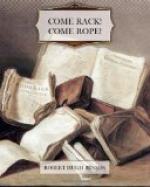Her voice shook a little. The boy bowed his head again. She went on:
“But there are some things,” she said, “more sacred than anything on earth—those things that come from heaven. Now, I wish to say this—and then have done with it: that if such should be God’s will, I would not hold you for a day. We are Catholics, you and I.... Your father—”
Her voice broke; and she stopped; yet without leaving go of her hold upon herself. Only she could not speak for a moment.
Then a great fury seized on the boy. It was one of those angers that for a while poison the air and turn all things sour; yet without obscuring the mind—an anger in which the angry one strikes first at that which he loves most, because he loves it most, knowing, too, that the words he speaks are false. For this, for the present, was the breaking-point in the lad. He had suffered torments in his soul, ever since the hour in which he had ridden into the gate of his own home after his talk in the empty chapel; he had striven to put away from him that idea for which the girl’s words had broken an entrance into his heart. And now she would give him no peace; she continued to press on him from without that which already pained him within; so he turned on her.
“You wish to be rid of me!” he cried fiercely.
She looked at him with her lips parted, her eyes astonished, and her face gone white.
“What did you say?” she said.
His conscience pierced him like a sword. Yet he set his teeth.
“You wish to be rid of me. You are urging me to leave you. You talk to me of God’s will and God’s voice, and you have no pity on me at all. It is an excuse—a blind.”
He stood raging. The very fact that he knew every word to be false made his energy the greater; for he could not have said it otherwise.
“You think that!” she whispered.
There, then, they stood, eyeing one another. A stranger, coming suddenly upon them, would have said it was a lovers’ tiff, and have laughed at it. Yet it was a deeper matter than that.
Then there surged over the boy a wave of shame; and the truth prevailed. His fair face went scarlet; and his eyes filled with tears. He dropped on his knees in the leaves, seized her hand and kissed it.
“Oh! you must forgive me,” he said. “But ... but I cannot do it!”
III
It was a great occasion in the hall that Easter Day. The three tables, which, according to custom, ran along the walls, were filled to-day with guests; and a second dinner was to follow, scarcely less splendid than the first, for their servants as well as for those of the household. The floor was spread with new rushes; jugs of March beer, a full month old, as it should be, were ranged down the tables; and by every plate lay a posy of flowers. From the passage outside came the sound of music.




